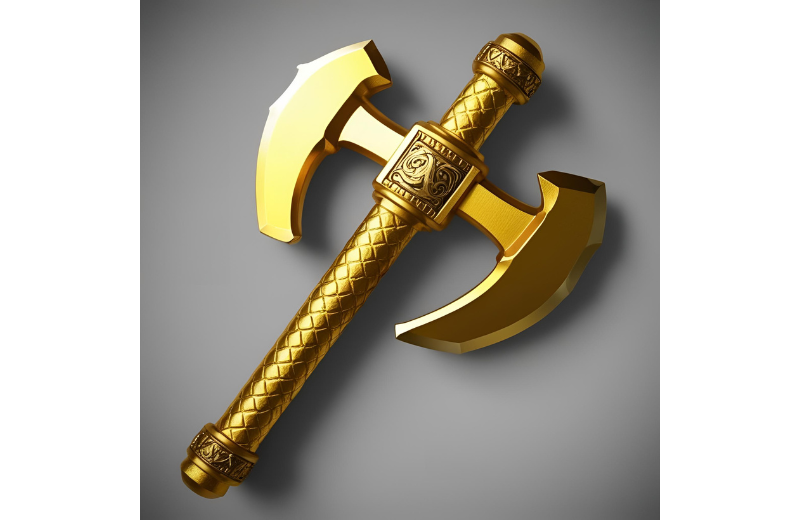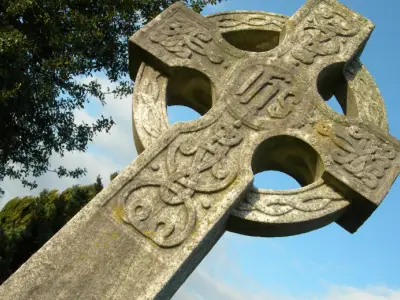If you’ve found yourself curious about the quieter, more reflective figures in Norse mythology, you may have come across the name Forseti. While gods like Thor and Odin dominate the tales with their thunder and wisdom, Forseti is a more peaceful, contemplative figure—a Norse god tied to justice, mediation, and fair judgment. For anyone interested in the full spectrum of Viking lore, understanding Forseti adds a layer of depth and richness to the mythological world.
Jump to:
- Who Was Forseti in Norse Mythology?
- Forseti's Myths
- The Role of Forseti in Norse Storytelling
- What Powers Did Forseti Possess?
- Symbols Associated with Forseti
- Forseti's Lineage and Connections
- Why Is Forseti Special?
- Forseti in Modern Culture
- Forseti's Worship and Legacy
- Frequently Asked Questions About Forseti
- Study Norse Mythology for £29
Recommended for you!
Best SellersWho Was Forseti in Norse Mythology?
Forseti, whose name translates to “The Presiding One” or “Chairman”, is a Norse god associated with justice, reconciliation, and truth. He’s often portrayed as a calm and wise deity who resolved disputes and ensured fairness among gods and mortals.
While he doesn’t feature heavily in surviving myths, Forseti’s character shines through in his role as a judge. He’s known for his ability to settle conflicts with peaceful solutions rather than violence—a notable contrast to many of the other gods in the Norse pantheon.
Forseti's Myths

There are surprisingly few stories in Norse mythology where the Norse god Forseti takes centre stage. Unlike other gods, Forseti doesn’t stir up drama or lead epic battles. But this absence from dramatic tales actually highlights his role: he represents balance, structure, and the resolution of chaos.
One key mention of Forseti comes from the Prose Edda, where he’s described as a wise god who “settles all disputes, both among gods and men.” He sits in a grand hall where he listens to arguments and gives fair rulings. It’s said that anyone who came to him with a quarrel left satisfied, their issue resolved in peace.
While Forseti is sometimes overlooked in mythology, he’s far from unimportant. His presence symbolises the value the Norse people placed on justice and social harmony, even in a world filled with war and vengeance.
The Role of Forseti in Norse Storytelling
In Norse storytelling, Forseti’s role is not one of action, but of reason. He provides a vital counterbalance to the chaos often found in myths. When gods clash or when humans fall into disagreement, Forseti is the figure who steps in—not with weapons, but with wisdom.
Forseti is a reminder that not all strength lies in physical might. In a world shaped by battles, monsters, and Ragnarok, his quiet wisdom is a breath of fresh air.
What Powers Did Forseti Possess?

Though his abilities are not as physically dramatic as some other Norse gods, Forseti’s powers are clear through his influence and role in mythology.
- Divine Judgement and Mediation: Forseti had an unparalleled ability to see the truth in any situation and deliver fair, balanced decisions. He was the god to whom both mortals and gods turned when conflicts needed resolution.
- Power of Persuasion: It’s said that Forseti’s words were so compelling that even bitter enemies would find themselves in agreement. His voice carried an almost magical quality, soothing tempers and fostering cooperation.
- Creator of Harmony: In a mythological world often ruled by chaos and violence, Forseti’s gift was his capacity to instil peace. His presence turned hostility into reasoned dialogue, making him a powerful force for stability and justice.
Symbols Associated with Forseti

Forseti’s symbols reflect the values he upheld—clarity, fairness, and peaceful resolution.
- Golden Axe: This is the most widely associated symbol of Forseti. Not a weapon of war, but a symbol of discernment and truth, the axe represents his ability to “cut through” lies and find honest solutions.
- Glitnir, the Hall of Light: Forseti’s shining hall, with its silver roof and golden pillars, is a radiant symbol of enlightenment and justice. It is where he held court, ensuring fairness in all rulings.
- Colours of Purity and Justice: Gold, silver, and white are colours often linked to Forseti. These shades reflect his divine role as a bringer of clarity, peace, and balanced judgment.
What Animals Are Associated with Forseti?
Unlike gods like Odin, who has ravens, or Freyja, who rides a chariot pulled by cats, there are no specific animals directly associated with Forseti. However, in modern interpretations, animals like the owl (a symbol of wisdom) or dove (a symbol of peace) are sometimes linked to him because of the values he represents.
Forseti's Lineage and Connections
Unlike many gods who are defined by conflict or dominion, Forseti’s identity is deeply rooted in his parentage and the values it represents. He’s the son of Baldur and Nanna, two of the most revered and gentle figures in Norse mythology. Baldur’s radiant nature and tragic fate cast a long shadow, and Forseti is often seen as an extension of his father’s peace-loving spirit.
His heritage places him firmly among the Aesir, the principal family of Norse gods. This connection helps explain his elevated role as a divine judge and peacemaker. Forseti doesn’t wield his power through conquest or fear, but through wisdom—a trait he seems to have inherited from his noble lineage.
Why Is Forseti Special?
What makes Forseti stand out is his dedication to peace and fairness. In a pantheon filled with gods of war, trickery, and storm, Forseti’s quiet justice is both unique and essential.
He reminds us that resolution without violence is a powerful act. This peaceful nature doesn’t make him weak—in fact, it positions him as one of the strongest gods in terms of influence and respect. In many ways, he represents the ideal leader: calm, fair, and wise.
Forseti in Modern Culture

Although he may not enjoy the same mainstream popularity as other gods, Forseti still has a quiet but meaningful presence in modern culture. His role as a god of justice and fair judgement has led to his name being adopted by legal institutions and judicial concepts, particularly in Iceland, Germany, and Scandinavia. For instance, in Icelandic, the word forseti now means president, reflecting his continued association with leadership and fair governance.
In video games, Forseti appears as a subtle reference rather than a central character. In Fire Emblem: Genealogy of the Holy War, Forseti is the name of a powerful wind tome, wielded by a character known for justice and wisdom. In literature, Forseti occasionally features in novels and retellings of Norse mythology that aim to explore lesser-known gods, such as in Neil Gaiman’s Norse Mythology, where his name is briefly acknowledged.
He also makes appearances in discussions of legal philosophy and mythological ethics, as scholars often cite him as a mythological archetype for restorative justice.
Forseti's Worship and Legacy
Forseti was not widely worshipped with temples or large cult followings. However, there is evidence to suggest that he was respected among lawmakers, chieftains, and those involved in arbitration and governance. His hall, Glitnir, was said to be the most radiant of all, symbolising truth and integrity—a place where all disputes could be fairly settled.
In Frisia (modern-day northern Netherlands and parts of Germany), there are even legends that Forseti was worshipped under the name Fosite, and an island called Heligoland (formerly Fositesland) is linked to him in some medieval Christian texts. It was considered a sacred site, where justice and rituals were performed, possibly in his honour.
Though the practice of worship faded with the spread of Christianity across Scandinavia, Forseti's legacy endured in the cultural values passed down through Norse law and ethics. His influence remains in the modern emphasis on dialogue, diplomacy, and justice—not just in stories, but in the very structure of leadership roles and legal traditions that followed.
Recommended for you!
Best SellersFrequently Asked Questions About Forseti
What was Forseti the god of?
Forseti was the god of justice, peace, and truth. He presided over disputes and legal matters, using his unmatched wisdom to guide people toward fair and peaceful resolutions. His influence extended to both gods and mortals, making him one of the most respected deities when it came to issues of morality and fairness.
What is Forseti known for?
He’s known for resolving disputes and promoting fairness. Unlike many other Norse gods who favoured battle and bold action, Forseti preferred diplomacy, conversation, and rational thought. He served as a divine arbitrator, ensuring that justice prevailed without the need for violence.
Is Forseti the son of Baldur?
Forseti is believed to be the son of Baldur and Nanna, making him part of the Aesir family. This connection ties him to one of the most beloved and pure-hearted figures in Norse mythology.
What is the Hall of Forseti?
The hall of Forseti is called Glitnir, which means "shining" or "glittering." It’s said to have silver walls and golden pillars, radiating light and symbolising truth and justice. This divine courtroom is where Forseti would listen to disputes and deliver fair rulings. The hall’s glowing appearance reflects his commitment to clarity, enlightenment, and impartial decision-making.
Study Norse Mythology for £29
Norse mythology is full of fascinating gods, legends, and deeper meanings waiting to be explored. If you’re fascinated by Forseti and Norse mythology, why not take your knowledge further? At Centre of Excellence, you can enrol in the Norse Mythology Diploma Course for just £29! Learn about the gods, myths, and legends in greater depth and explore the rich history of the Vikings.













